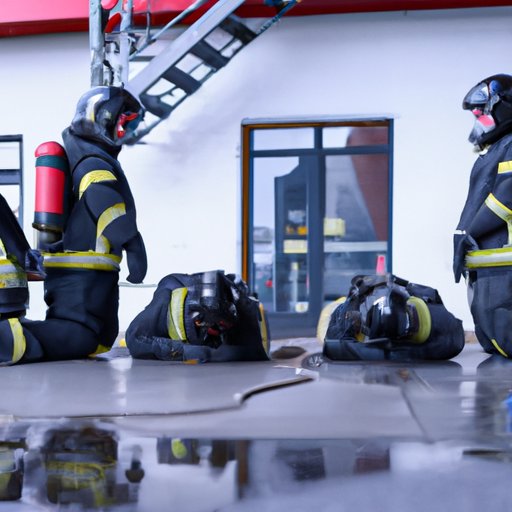Introduction
Firefighters are individuals who are trained to respond to various types of emergencies, such as fires, medical emergencies, hazardous material spills, natural disasters, and more. They are essential members of the emergency response team and play a key role in protecting people and property from harm or destruction.
In this article, we’ll explore the requirements, tools, and career opportunities for becoming a firefighter. We’ll discuss the education and certifications needed, physical and mental training, necessary equipment and tools, roles in responding to emergencies, and importance of teamwork and communication.
Requirements for Becoming a Firefighter
Becoming a firefighter is no easy task. It requires commitment, dedication, and a willingness to learn. To be successful, you must have certain skills, knowledge, and abilities. Here are some of the requirements for becoming a firefighter.
Education and Certifications Needed
Most fire departments require applicants to have at least a high school diploma or GED. Some departments may also require applicants to have an associate’s or bachelor’s degree in a related field, such as fire science or emergency management.
In addition, firefighters must obtain certifications in areas such as hazardous materials, first aid, and CPR. These certifications are typically obtained through state-approved training programs.
Physical and Mental Training
Firefighters must be physically fit and able to perform strenuous activities, such as climbing ladders, carrying heavy equipment, and lifting victims. To meet these requirements, firefighters must undergo regular physical fitness tests and participate in physical training.
Mental training is also important for firefighters. A study conducted by the University of Central Florida found that firefighters must be able to make quick decisions in stressful situations and communicate effectively with others. They must also be able to remain calm under pressure.

Necessary Equipment and Tools Used by Firefighters
Firefighters use a variety of equipment and tools to do their job safely and effectively. Here are some of the most common items used by firefighters.
Personal Protective Equipment
Personal protective equipment (PPE) is essential for firefighters. This includes items such as helmets, boots, gloves, and special protective clothing. PPE helps protect firefighters from heat, smoke, and other hazards they may encounter while on the job.
Firefighting Tools
Firefighters also use specialized tools to help them fight fires. These include hoses, ladders, and hand-held extinguishers. Firefighters use these tools to control and extinguish fires, and to rescue people and animals.

Role of Firefighters in Responding to Emergency Situations
Firefighters play an important role in responding to emergency situations. They must be prepared and ready to respond quickly and efficiently. Here’s what they do when responding to an emergency.
Preparation for Emergencies
Before responding to an emergency, firefighters must prepare themselves and their equipment. This includes ensuring their PPE is in good condition, checking their tools and equipment, and reviewing safety protocols.
Assessing and Dealing with Emergencies
Once on the scene, firefighters must assess the situation and determine the best course of action. They must then take the necessary steps to deal with the emergency, such as putting out fires, rescuing victims, providing medical assistance, and controlling hazardous materials.

Importance of Teamwork and Communication Among Firefighters
Teamwork and communication are essential for firefighters to do their job safely and effectively. Here’s why teamwork and communication are so important.
Benefits of Working Together
When working together, firefighters can draw on each other’s strengths and experience. This enables them to make quick decisions and take effective action in emergency situations. As noted by the National Fire Protection Association, “teamwork is essential for the success of any firefighting operation.”
Strategies for Effective Communication
Effective communication is also critical for firefighters. They must be able to communicate clearly and concisely with their colleagues and other emergency responders. To ensure effective communication, firefighters must use standard terminology, maintain situational awareness, and provide clear instructions.
Career Opportunities in Firefighting
The demand for firefighters is growing, making it an attractive career option. Here are some of the job options and advancement opportunities available to firefighters.
Job Options
Firefighters can work in a variety of settings, including fire stations, airports, hospitals, and industrial sites. They may also work as instructors, investigators, or emergency medical technicians.
Advancement Opportunities
Firefighters can advance their careers by taking on positions of greater responsibility or by pursuing specialized training. For example, they may become certified in hazardous materials or wildland firefighting. They may also pursue higher education and become supervisors or chiefs.
Conclusion
In conclusion, becoming a firefighter is a challenging but rewarding career. To be successful, firefighters must meet certain requirements, such as having a high school diploma, obtaining certifications, and undergoing physical and mental training. They must also be familiar with the necessary equipment and tools, understand their role in responding to emergencies, and recognize the importance of teamwork and communication. Additionally, there are numerous job and advancement opportunities for those interested in a career in firefighting.
By following the guidelines outlined in this article, you can gain a better understanding of the requirements and expectations for becoming a firefighter. With dedication and hard work, you can pursue a successful career in this field.
(Note: Is this article not meeting your expectations? Do you have knowledge or insights to share? Unlock new opportunities and expand your reach by joining our authors team. Click Registration to join us and share your expertise with our readers.)
